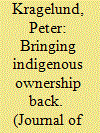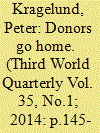| Srl | Item |
| 1 |
ID:
114932


|
|
|
|
|
| Publication |
2012.
|
| Summary/Abstract |
African economies are currently experiencing an upsurge in foreign ownership of key parts of their economies. This, however, is not new, and in the wake of independence several African countries pursued indigenisation policies to bring ownership back to their own citizens. Now indigenisation policies thrive again, this time disguised in terms such as 'empowerment', but just as politicised as in the 1970s. Zambia is at the heart of this development. In the light of liberalisation, booming commodity prices and the increasing importance of Chinese investors, this article seeks to further our understanding of how processes of exclusion interact with domestic politics in Zambia. It argues that the Citizens Economic Empowerment Commission, a new institution to bring ownership back to Zambians, builds on a long tradition of nationalist policies in Zambia, while its actual work is strictly related to the critique of the growing foreign dominance over the economy, and in particular of the upsurge in Chinese investments.
|
|
|
|
|
|
|
|
|
|
|
|
|
|
|
|
| 2 |
ID:
128467


|
|
|
|
|
| Publication |
2014.
|
| Summary/Abstract |
The international development arena is currently subject to major changes in the geographies of power. In this article I analyse how and to what extent the (re)entry on the development scene of China, India and Brazil, together with increasing prices for primary commodities and improved access to international finance, has affected Zambia's political leverage to set, implement and fund its own developmental policies. I argue that, while real changes in external financial flows comparable to aid from these non-traditional state actors are still small, these actors' experience is providing Zambia with an alternative development model that combines purposive state intervention with market-based economic growth and integration into world markets. While Zambia may be taking the first steps in strengthening its 'sovereign frontier', the extent of this movement is still small and its development outcomes are far from assured.
|
|
|
|
|
|
|
|
|
|
|
|
|
|
|
|